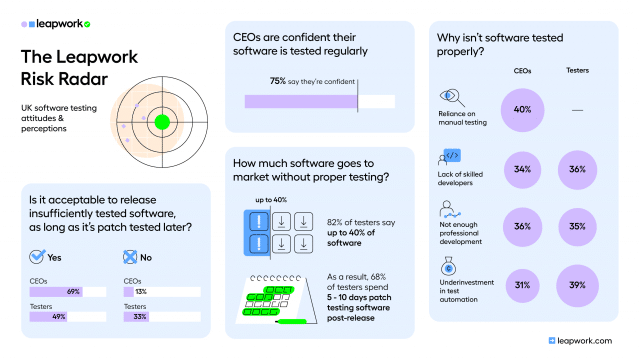Lack of software testing leaves businesses open to risk

New research finds 69 percent of UK CEOs think it's acceptable to release software that hasn't been properly tested, so long as it's patch tested later. But this could be putting businesses at reputational and financial risk.
The study from software test automation company Leapwork also reveals that 82 percent of testers say that up to 40 percent of software goes to market without sufficient testing. As a result, 68 percent of testers claim their teams spend five to 10 days per year patching.
But despite testers concerns, 75 percent of CEOs say they're confident their software is tested regularly. CEOs are aware of the risks of insufficient testing, with 71 percent saying they’re concerned about losing their jobs in the wake of a software failure. About three-quarters (73 percent) of testers have the same fear, while 54 percent of CEOs say software failures have harmed their company's reputation in the last five years.
Christian Brink Frederiksen, co-founder and CEO at Leapwork, says, "Our research shows the widespread issues that exist in software testing today. While CEOs and testers understand the consequences of releasing software that hasn't been tested properly, an alarming number still think it's acceptable to issue it and prefer to rely on patch testing afterwards to fix any problems. This often comes down to not thinking there is a viable option and choosing speed over stability -- a devil's dilemma. But what's more concerning is the disconnect between CEOs and their developer teams, indicating that testing issues are falling under the radar and not being escalated until it’s too late."
So why isn't software being properly tested? 40 percent of CEOs cite 'reliance on manual testing' as being the main reason. 'Underinvestment in test automation' is another, with only half of testers saying they are using some element of automation. 34 percent of CEOs and 36 percent of testers cite 'lack of available skilled developers' and 34 percent of CEOs and 35 percent of testers say 'underinvestment in testing personnel including continuous professional development'.
"As more companies transition from manual testing to automation to meet the testing requirements of increasingly complex software, they're struggling to scale their chosen solutions and leverage their existing QA departments as many solutions in the market rely on low code to manage the process," Frederiksen adds. "Combine that with the pressure of meeting digital transformation goals and companies are cutting corners and taking unnecessary risks."
There's an overview of the findings in the infographic below.

Image Credit: alphaspirit / Shutterstock